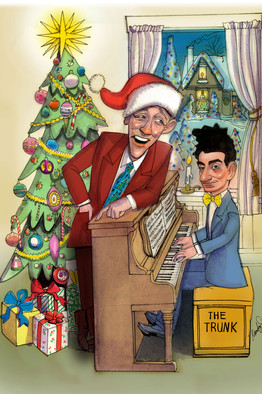I’ve been having fun on Facebook listing Christmas songs that are not overly-familiar and haven’t worn out their welcome.
For my final submission of alternative Christmas songs, I’d like to bend (my own) rules just a little.
You probably think it is unfair to introduce the best-known and most performed Christmas song in this list. However, many people have never heard the whole thing. In fact, not many know that there is more to the song than you hear in Walmart or on the radio.
“The sun is shining, the grass is green
The orange and palm trees sway
I’ve never seen such a day
In Beverly Hills, L.A.
But it’s December the twenty-fourth
And I am longing to be up north”
The origins of Irving Berlin’s “White Christmas” are shrouded in legends. And if we can’t be sure of the facts from something this public less than a hundred years later, it makes one wonder how we can be so sure about legendary events of past millennia.
Back to topic — many versions were sung by Bing Crosby on radio, TV and in the movies and the recording in all versions is honored as the best-selling single of all time (spanning every recording format ever invented).
Estimated sales of Der Bingle’s versions exceed 100 million copies worldwide and add the many other versions recorded and you reach over 150 million copies.
The lack of certainty stems from the fact that the original recording was released before the first pop charts. However, counting includes royalty reports to ASCAP (the major songwriting rights accounting organization) of which Berlin was a founding member.
Where and how he wrote it is also lost in a swarm of legends. He may have worked on it as early as 1938. One story is that he wrote it in 1940 while warming his tootsies in La Quinta, a resort near Palm Springs, CA. However the Arizona Biltmore claims that he composed it while staying there.
Whatever the time and place, legend has it that Irving was excited by his new masterpiece. “Grab your pen and take down this song,” he reportedly told his secretary. “I just wrote the best song I’ve ever written — heck, I just wrote the best song that anybody’s ever written!”
Berlin couldn’t write music. He hummed a tune or pecked it out on a piano and a musical copyist wrote the score.
Of course, the song was introduced by Bing Crosby, on his NBC radio show The Kraft Music Hall on Christmas Day, 1941. The recording was copied onto a 78 RPM disc (they called it a transcription) and is reportedly held by Crosby’s estate to this day. He did not sing the verse then.
Nor did Crosby sing the verse when he debuted “White Christmas” in the movie Holiday Inn in 1942. And he also didn’t sing it in the 1954 film with the same name as the song.
Even without the verse, Crosby knew it was a keeper. He reportedly told the composer, “I don’t think we have any problems with that one, Irving.”
It didn’t sell all that well in 1941 (the world was rather occupied with Pearl Harbor that December and mobilization for war immediately afterward.) But by the next Christmas, “White Christmas” really took off. It stayed on the charts a long time (about 3 months) and became an annual best-seller (Billboard charts for record sales started in 1951).
“Holiday Inn” was a hit, and the song “White Christmas” won the Academy Award for Best Original Song in 1942. Crosby sang it as a duet with an actress whose voice was dubbed by a studio singer.
Another movie, the 1954 musical actually named “White Christmas,” became the highest-grossing film of 1954.
Yet Bing still never recorded the introductory verse, and he never sang it for the public until a TV show in the late 1960s.
Meanwhile, legends kept popping up that the song reflected “a satire on Hollywood types lolling around a pool, pretending to a nostalgia they didn’t really feel,” according to Wikipedia. That pool might have been at either the Beverly Hills Hotel or the Biltmore in Phoenix.
“The version most often heard today on radio during the Christmas season is the 1947 re-recording. The 1942 master was damaged due to frequent use,” Wikipedia reports, and it quotes a modest Crosby as saying, “a jackdaw with a cleft palate could have sung it successfully.”
This is the one where he whistles the second time through.
The version I want to share with you to wind up our alternative Christmas song series is a beautiful rendition by The Divine Miss Bette Midler from her tribute album to Rosemary Clooney (and included on her album “Cool Yule”.)
Merry Christmas music lovers. Enjoy the season with music and hope that William Congreve was correct when he wrote, “Musick has charms to soothe a savage breast,” because it is pretty savage out there. And peace on Earth for all.


